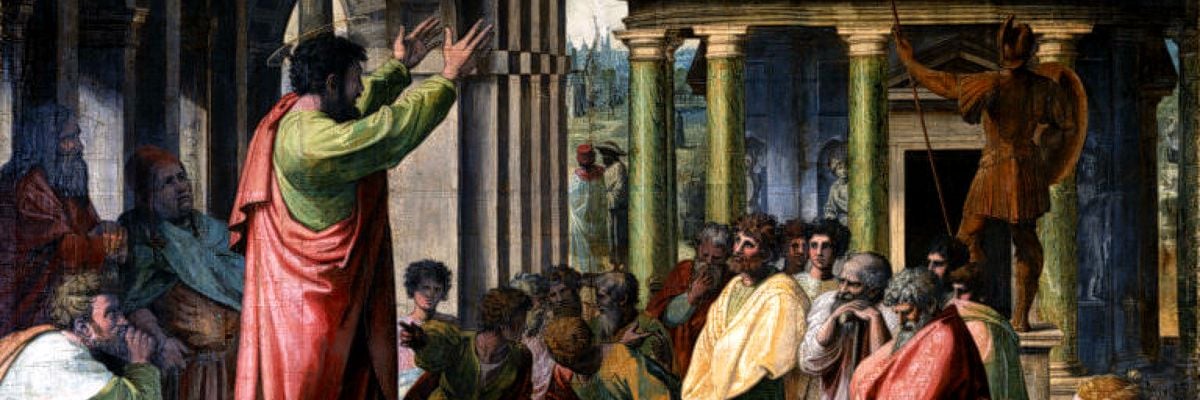
In 1947, a group of Christians in Nebraska formed a fellowship known today as the Berean Church Fellowship. The name of the group is borrowed from the Acts of the Apostles 17:11, which the group quotes on their website: “Now the Bereans… Received the message with great eagerness and examined the Scriptures every day to see if what Paul said was true.”
The fellowship’s Articles of Faith begin with the following statement: “We believe the Bible, consisting of both the Old and New Testament Scriptures in their entirety, is the only divinely inspired, inerrant, objectively true, and authoritative written Word of God, and the only infallible rule of faith and practice.”
In other words, the fellowship subscribes to the doctrine of sola scriptura (“by scripture alone”) and believes it patterns itself after the Bereans about which Luke wrote. Using this verse as evidence against Tradition is not really unusual; in fact, many sola scriptura adherents quote Acts 17:11 as “proof” that the Bible is the sole rule of the Christian faith. Some seem to imagine the Bereans to be a group of early Christians faithfully living according to what the Bible teaches when Paul comes along claiming to be a teacher. They listen to what he has to say but they also cautiously compare his teachings to what their Bibles say in order to be sure that what Paul is saying is authentic Christian doctrine.
Interestingly, though, a closer look at Acts 17:11 reveals that the people of Berea were not sola scriptura adherents at all. In actuality, they were primarily Jews converting to Christianity through Paul’s use of Sacred Tradition. Here’s the verse within its fuller context:
The brethren immediately sent Paul and Silas away by night to Berea; and when they arrived they went into the Jewish synagogue. Now these Jews were more noble than those in Thessalonica, for they received the word with all eagerness, examining the scriptures daily to see if these things were so. Many of them therefore believed, with not a few Greek women of high standing as well as men. (Acts 17:10-12)
Luke’s words commend the Bereans for being more noble than the Thessalonians because they eagerly received “the word.” They also examined the scriptures to see if the word was true. So just who were the Bereans? What was “the word” they received and what scriptures did they examine?
Before the New Testament
The Bereans, we’re told, were mainly Jews (and some Greeks), not Christians, and they even had a Jewish synagogue. The word they received was Paul’s teaching about Jesus—that same teaching which he sums up in his first letter to the Corinthians, “For I delivered to you as of first importance what I also received, that Christ died for our sins in accordance with the scriptures” (1 Cor. 15:3). The scriptures mentioned here by Paul are the same scriptures which the Bereans examined?the Old Testament scriptures. These were the only scriptures of the day, as no New Testament Scripture existed at the time. Most of the New Testament had not yet been written and what had been written had not yet been canonized so as to attain the status of Scripture. What we see here is a group of people being taught about Christianity by Paul prior to the existence of the New Testament. They eagerly listened to Paul while examining the Old Testament Scripture.
This all makes sense when we understand this event in its historical context. The event occurred during Paul’s second missionary journey. On his journeys Paul taught the good news of Christianity as Jesus had commissioned him to do. As a Jewish convert to Christianity himself, he knew Jewish Scripture well and he knew that it prophesied about Jesus. He undoubtedly explained this Scripture to enlighten other Jews about the truth of Christianity. These Jews would have to examine their Old Testament Scripture to see if what Paul was saying made sense. It did, and many Jews, including some of the Bereans, became Christians.
Not of Human Origin
Paul’s method was one of the ways Christianity was first taught. And Paul’s teaching is an example of what the Catholic Church calls Sacred Tradition.
The Catechism of the Catholic Church explains,
The Tradition here in question comes from the apostles and hands on what they received from Jesus’ teaching and example and what they learned from the Holy Spirit. The first generation of Christians did not yet have a written New Testament, and the New Testament itself demonstrates the process of living Tradition. (CCC 83)
Now, sola scriptura adherents are quick to point out that tradition is condemned in Scripture. Indeed, some forms of tradition are condemned. For example, Jesus denounced a certain tradition when he said, “And why do you transgress the commandment of God for the sake of your tradition?” (Matt. 15:3; see also Mark 7:8-9). In this passage Jesus was condemning a particular Jewish practice of seemingly donating money to God while in reality sheltering it from being used to care for one’s parents. This was a tradition?but certainly not a sacred one?which broke the commandment to honor one’s mother and father. Jesus rightfully condemned it, but his condemnation was not meant to be applied to every tradition.
Another verse sola scriptura adherents point out is, “See to it that no one makes a prey of you by philosophy and empty deceit, according to human tradition, according to the elemental spirits of the universe, and not according to Christ” (Col. 2:8). Certainly the Catholic Church agrees with Paul that such human traditions are to be rejected. But Sacred Tradition is not merely human tradition. It is the teaching of Jesus and the Apostles guided by the Holy Spirit. It originated with Christ and is inspired by the Holy Spirit, hardly of human origin.
So, if Scripture doesn’t explicitly condemn Sacred Tradition, does it support it? It seems that since the Catholic Church claims that the New Testament came after Sacred Tradition, it makes sense that the New Testament would show ample evidence of Sacred Tradition. In fact, it does. Paul’s teaching in Berea as cited in Acts is one of many places where the New Testament provides evidence of Sacred Tradition.
For example, Jesus’ commandment to the Apostles at the end of Matthew’s Gospel logically assumes the necessity of Sacred Tradition:
Go therefore and make disciples of all nations, baptizing them in the name of the Father and of the Son and of the Holy Spirit, and teaching them to obey all that I have commanded you. And remember, I am with you always, to the end of the age. (Matt. 28:19-20)
Jesus didn’t tell the apostles to write down everything he had taught them. He simply commanded them to teach it. Much of this teaching later made its way into Sacred Scripture, but every bit of it was and still is considered Sacred Tradition.
Hold to the Tradition
In fact, we know that not everything Jesus taught was eventually committed to writing. John tells us as much at the end of his Gospel: “But there are also many other things which Jesus did; were every one of them to be written, I suppose that the world itself could not contain the books that would be written” (John 21:25). Some of Jesus’ teachings had not yet made it into written form by the date John finished writing his Gospel.
Turning to Luke, we see that the author begins his Gospel by explaining why he is writing it. Luke points out that others have already committed certain things to writing, and he thinks it is a good idea to write down what his reader has already been taught:
Inasmuch as many have undertaken to compile a narrative of the things which have been accomplished among us, just as they were delivered to us by those who from the beginning were eyewitnesses and ministers of the word, it seemed good to me also, having followed all things closely for some time past, to write an orderly account for you, most excellent Theophilus, that you may know the truth concerning the things of which you have been informed. (Luke 1:1-4)
Luke, then, commits to writing what has already been taught. That teaching is Sacred Tradition just as surely as Luke’s Gospel will later be recognized as Sacred Scripture.
Moving beyond the Gospels and Acts of the Apostles, we find that Paul provides even more explicit evidence of Sacred Tradition in his writings. Here are three examples:
- “I commend you because you remember me in everything and maintain the traditions even as I have delivered them to you” (1 Cor. 11:2).
- “Now we command you, brethren, in the name of our Lord Jesus Christ, that you keep away from any brother who is living in idleness and not in accord with the tradition that you received from us” (2 Thess. 3:6).
- “So then, brethren, stand firm and hold to the traditions which you were taught by us, either by word of mouth or by letter” (2 Thess. 2:15).
In the third verse, Paul speaks of Sacred Tradition as being taught both orally and in writing. The written teaching would later be canonized as Sacred Scripture, so this verse suggests how Sacred Tradition preceded Sacred Scripture.
Near the end of Paul’s ministry he instructed Timothy to carry on the Sacred Tradition passed down to him: “Follow the pattern of the sound words which you have heard from me, in the faith and love which are in Christ Jesus; guard the truth that has been entrusted to you by the Holy Spirit who dwells within us” (2 Tim. 1:13-14). Paul went on to instruct Timothy to pass down that Sacred Tradition to others: “[A]nd what you have heard from me before many witnesses entrust to faithful men who will be able to teach others also” (2 Tim. 2:2).
Throughout history, the Catholic Church alone has continued to safeguard and teach the fullness of the Christian faith. This faith is complete only when it includes Sacred Tradition. The Catechism sums it up well:
This living transmission, accomplished in the Holy Spirit, is called Tradition, since it is distinct from Sacred Scripture, though closely connected to it. Through Tradition, “the Church, in her doctrine, life and worship, perpetuates and transmits to every generation all that she herself is, all that she believes. The sayings of the holy Fathers are a witness to the life-giving presence of this Tradition, showing how its riches are poured out in the practice and life of the Church, in her belief and her prayer.” (CCC 78)
The Berean Church Fellowship and other sola scriptura adherents would do well to follow in the footsteps of the original Bereans and embrace Sacred Tradition. But of course the result would be one fewer Christian denomination and thousands more Catholics.



